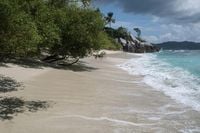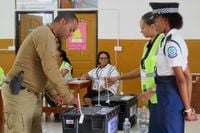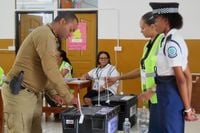On Saturday, September 27, 2025, the archipelago nation of Seychelles found itself at a crossroads, as its citizens flocked to the polls to select both a new president and members of parliament. The island chain, known for its turquoise waters, luxury resorts, and breathtaking biodiversity, is now the stage for a contest that could shape its political and social landscape for years to come.
Voters began lining up early, with polling stations opening promptly at 7 a.m., according to the Associated Press. The anticipation was palpable across Mahé, the largest island and home to the capital, Victoria. Electoral authorities reported that all stations opened on schedule and that voting proceeded smoothly, with long lines forming at many sites—a clear sign of robust civic engagement among the country’s 77,000 registered voters.
At the heart of this election is President Wavel Ramkalawan, a 64-year-old Anglican priest-turned-politician, who is seeking a second term in office. Ramkalawan’s journey to the presidency is itself a remarkable tale. After five unsuccessful attempts, he made history in 2020 by becoming the first opposition leader since Seychelles' independence in 1976 to unseat the long-ruling party. His victory then was seen as a watershed moment, signaling the maturing of democracy in Africa’s smallest country.
Ramkalawan’s main challenger is Patrick Herminie, a seasoned lawmaker and former speaker of the National Assembly, representing the United Seychelles Party. Herminie, well-known in the political arena, previously served as parliamentary speaker from 2007 to 2016 and later chaired the national Agency for the Prevention of Drug Abuse and Rehabilitation from 2017 until 2020.
This time around, the stakes are high. The ruling Linyon Demokratik Seselwa party, to which Ramkalawan belongs, has campaigned on a platform emphasizing economic recovery, social development, and environmental sustainability. The country’s economy—fueled by luxury tourism and environmental travel—has made Seychelles the richest nation in Africa by gross domestic product per capita, according to the World Bank. This economic boom has fostered a burgeoning middle class, but it has also bred new opposition to the ruling party, as expectations for good governance and equitable development rise.
One of Ramkalawan’s most lauded achievements, as noted by Bloomberg, was his stewardship during the COVID-19 pandemic. He is credited with overseeing one of the world’s fastest and most comprehensive vaccine rollouts, which helped Seychelles reopen to visitors and revive its critical tourism sector. That said, the president now faces a crowded field, with seven rivals vying for the top job. If no candidate secures more than 50% of the vote, the two leading contenders will advance to a runoff—a scenario that could further test the country’s political stability.
But not all is sun and sand in this island paradise. Just a week before the election, controversy erupted over a government decision to grant a long-term lease on part of Assomption Island, the country’s largest, to a Qatari company for a luxury hotel project. The deal, which includes the reconstruction of an airstrip to accommodate international flights, has drawn fierce criticism from activists and opposition figures. They argue that the agreement prioritizes foreign interests at the expense of Seychelles’ long-term welfare and sovereignty over its land. The case has even prompted activists to file a constitutional challenge, underscoring the deep anxieties about the nation’s future direction.
Environmental concerns are never far from the surface in Seychelles, whose 115 islands are scattered across some 390,000 square kilometers (150,579 square miles) of the Indian Ocean. The country’s unique geography, while stunning, leaves it acutely vulnerable to the impacts of climate change—especially rising sea levels. Both the World Bank and the United Nations Sustainable Development Group have highlighted Seychelles as a frontline state in the global fight against climate threats, making environmental policy a key issue in the election.
Yet perhaps the most urgent and divisive challenge facing the nation is its escalating drug crisis. The 2023 Global Organized Crime Index painted a sobering picture, noting that Seychelles now suffers from one of the world’s highest rates of heroin addiction. Out of a population of just 120,000, an estimated 6,000 people are believed to use heroin, with some analysts suggesting addiction rates could be as high as 10%. Most of the population lives on Mahé, where the effects of the crisis are most acutely felt.
This issue has become a political flashpoint. Critics argue that President Ramkalawan has largely failed to get the problem under control. Ironically, his chief rival, Herminie, has also come under fire for his own track record, having led the national anti-drug agency during a period when addiction rates continued to climb. The Associated Press reported that both men have faced tough questions from voters and civil society groups about their ability to address what has become a national emergency.
Underlying these headline issues is the broader question of how Seychelles will balance economic growth, environmental stewardship, and social cohesion. The country’s rapid ascent up the development ladder has brought prosperity, but it has also exposed new vulnerabilities. The influx of foreign investment, while vital for tourism and infrastructure, raises difficult questions about who truly benefits and how to safeguard the islands’ unique heritage.
On the political front, the presence of multiple candidates and the possibility of a runoff reflect the vibrancy—and the challenges—of Seychelles’ democratic experiment. The 2020 election that brought Ramkalawan to power was hailed as a turning point, but the current contest will test whether that momentum can be sustained. With both major parties facing scrutiny over their handling of the drug crisis, and with environmental and sovereignty concerns looming large, voters are being asked to make choices that go far beyond personalities or party loyalty.
As the polls closed and ballots began to be counted, there was a sense that Seychelles was at a pivotal moment. The outcome of this election will not only determine who leads the country for the next five years but will also shape how this small island nation navigates the complex interplay of prosperity, vulnerability, and national identity.
For now, the world watches as Seychelles’ citizens, from the bustling streets of Victoria to the remote corners of Assomption Island, exercise their right to decide their future. The path they choose may well serve as a bellwether for other small states grappling with similar challenges in an interconnected world.



